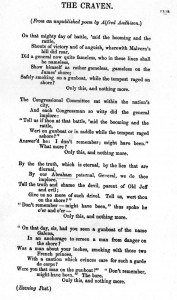I’d like to echo Rob Casper’s previous post by welcoming you to “From the Catbird Seat.” My name is Peter Armenti, and I’m the poetry and literature reference specialist for the Library’s Digital Reference Section. During the ten years I’ve worked at the Library, one of my primary responsibilities has been to connect Library users with literary resources available in our physical and digital collections. “From the Catbird Seat” gives me an opportunity to share with a larger audience many of the unique, interesting, and historically important literary collections and materials available at the Library.
Like most LC reference librarians, I spend part of every day responding to online inquiries submitted through our Ask a Librarian service. Among the questions I receive are those directed to the Poetry and Literature Center. While many of these questions relate to the activities of the current Poet Laureate or the services of the Poetry and Literature Center, others are more general in nature and are asked on a weekly, if not a daily, basis: “How do I find the full-text of a poem I remember reading as a child?” “Where can I find online literary criticism?” “How can I find reliable biographical information on a poet?” Some of my future posts—along with posts from other literature specialists who work at the Library—will focus on suggesting the best resources and research strategies for answering these types of questions.
In his introductory post, Rob shared the story of how he fell in love with books and libraries. I’d like to briefly share my own story about how I fell in love with poetry. When I was a high school freshman, my sister’s junior year English class was assigned to rewrite Edgar Allan Poe’s “The Raven,” retaining the same meter (trochaic octameter, which meant little to me at the time) but choosing a different subject. Although I vaguely remember my sister’s finished poem, “The Spider,” what remains unforgettable to this day is reading the copy of “The Raven” on my sister’s desk and becoming mesmerized by its rhythm and rhyme, its repetition and alliteration. I began to read it aloud everywhere I went, and within a few days had memorized it. Twenty years later, I now know several hundred poems by heart, all of which first captivated me by their aural qualities. Although I memorize poems purely for enjoyment, my hobby has also paid dividends on the job: there have been several times when I’ve been able to help a patron identify a poem based on a recollected word or phrase because it’s one that I memorized!
My first literary thrill at the Library came several months into my job when I was asked to give a presentation on Civil War poetry to high school teachers. As I searched our American Memory collections for appropriate poems, I stumbled across a poem titled “The Craven,” which humorously adapts “The Raven” to critique the ineffective leadership of George McClellan (who is unnamed in the poem) during the battle of Malvern Hill.
The poem immediately brought back to mind my first encounter with “The Raven,” and helped me appreciate how lucky I am to work with collections able to yield such serendipitous and surprising discoveries. I look forward to sharing future literary discoveries, and to highlighting the many literary activities, services, and resource available at the Library, on this blog.


January 10, 2012 at 8:16 pm
Thanks for your story. It made poetry closer to life.
January 11, 2012 at 5:23 pm
Wonderful post Peter! So happy that Poetry finally has a blog! Can’t wait to read more
January 15, 2012 at 1:55 pm
Thanks! I am going to share “The Craven” with my students when next I teach “The Raven” –talk about teaching across the curriculum.